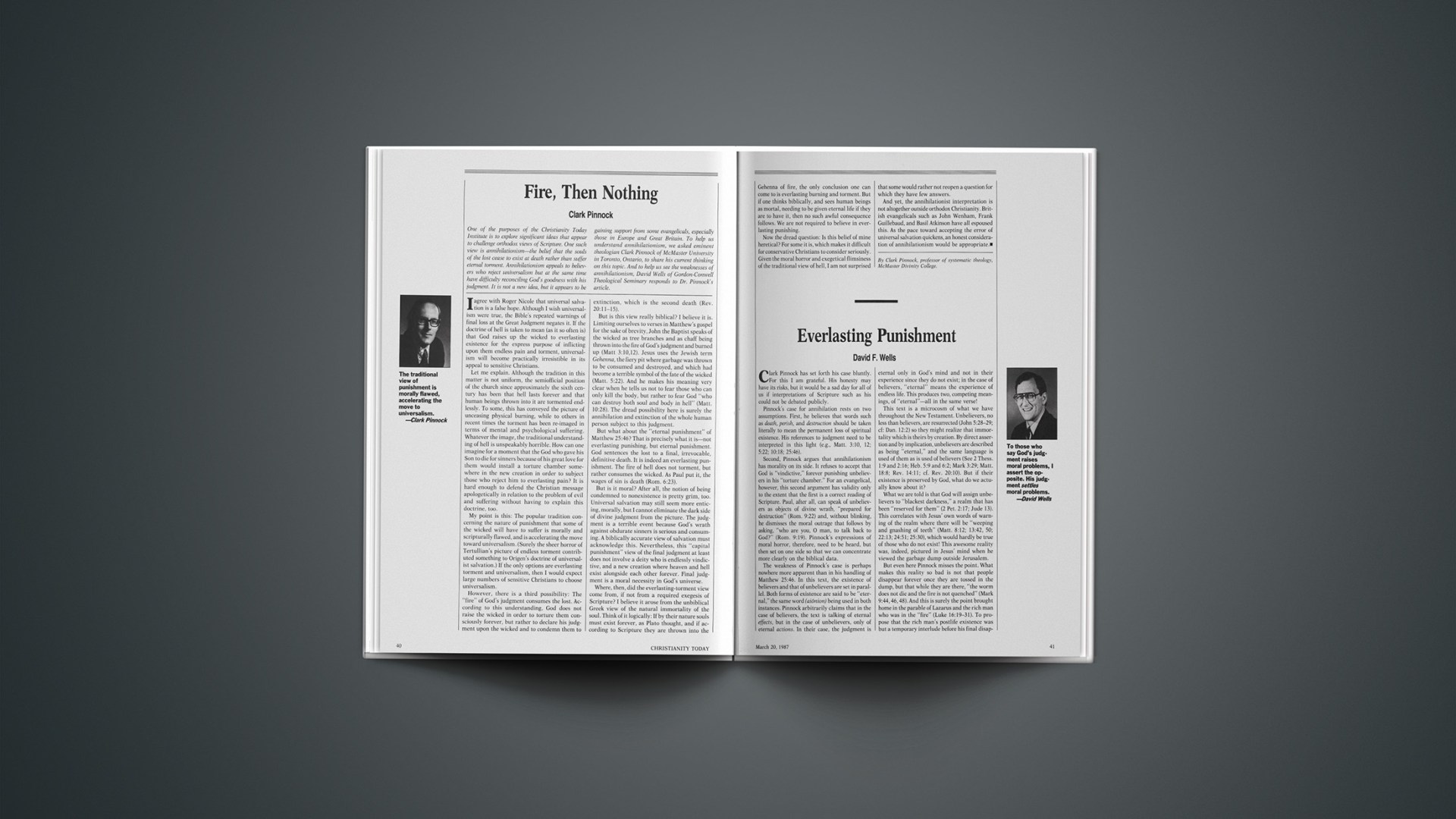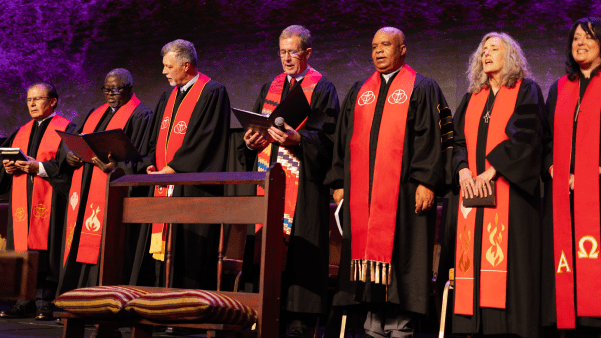One of the purposes of the Christianity Today Institute is to explore significant ideas that appear to challenge orthodox views of Scripture. One such view is annihilationism—the belief that the souls of the lost cease to exist at death rather than suffer eternal torment. Annihilationism appeals to believers who reject universalism but at the same time have difficulty reconciling God’s goodness with his judgment. It is not a new idea, but it appears to be gaining support from some evangelicals, especially those in Europe and Great Britain. To help us understand annihilationism, we asked eminent theologian Clark Pinnock of McMaster University in Toronto, Ontario, to share his current thinking on this topic. And to help us see the weaknesses of annihilationism, David Wells of Gordon-Conwell Theological Seminary responds to Dr. Pinnock’s article.
I agree with Roger Nicole that universal salvation is a false hope. Although I wish universalism were true, the Bible’s repeated warnings of final loss at the Great Judgment negates it. If the doctrine of hell is taken to mean (as it so often is) that God raises up the wicked to everlasting existence for the express purpose of inflicting upon them endless pain and torment, universalism will become practically irresistible in its appeal to sensitive Christians.
Let me explain. Although the tradition in this matter is not uniform, the semiofficial position of the church since approximately the sixth century has been that hell lasts forever and that human beings thrown into it are tormented endlessly. To some, this has conveyed the picture of unceasing physical burning, while to others in recent times the torment has been re-imaged in terms of mental and psychological suffering. Whatever the image, the traditional understanding of hell is unspeakably horrible. How can one imagine for a moment that the God who gave his Son to die for sinners because of his great love for them would install a torture chamber somewhere in the new creation in order to subject those who reject him to everlasting pain? It is hard enough to defend the Christian message apologetically in relation to the problem of evil and suffering without having to explain this doctrine, too.
My point is this: The popular tradition concerning the nature of punishment that some of the wicked will have to suffer is morally and scripturally flawed, and is accelerating the move toward universalism. (Surely the sheer horror of Tertullian’s picture of endless torment contributed something to Origen’s doctrine of universalist salvation.) If the only options are everlasting torment and universalism, then I would expect large numbers of sensitive Christians to choose universalism.
However, there is a third possibility: The “fire” of God’s judgment consumes the lost. According to this understanding, God does not raise the wicked in order to torture them consciously forever, but rather to declare his judgment upon the wicked and to condemn them to extinction, which is the second death (Rev. 20:11–15).
But is this view really biblical? I believe it is. Limiting ourselves to verses in Matthew’s gospel for the sake of brevity, John the Baptist speaks of the wicked as tree branches and as chaff being thrown into the fire of God’s judgment and burned up (Matt 3:10, 12). Jesus uses the Jewish term Gehenna, the fiery pit where garbage was thrown to be consumed and destroyed, and which had become a terrible symbol of the fate of the wicked (Matt. 5:22). And he makes his meaning very clear when he tells us not to fear those who can only kill the body, but rather to fear God “who can destroy both soul and body in hell” (Matt. 10:28). The dread possibility here is surely the annihilation and extinction of the whole human person subject to this judgment.
But what about the “eternal punishment” of Matthew 25:46? That is precisely what it is—not everlasting punishing, but eternal punishment. God sentences the lost to a final, irrevocable, definitive death. It is indeed an everlasting punishment. The fire of hell does not torment, but rather consumes the wicked. As Paul put it, the wages of sin is death (Rom. 6:23).
But is it moral? After all, the notion of being condemned to nonexistence is pretty grim, too. Universal salvation may still seem more enticing, morally, but I cannot eliminate the dark side of divine judgment from the picture. The judgment is a terrible event because God’s wrath against obdurate sinners is serious and consuming. A biblically accurate view of salvation must acknowledge this. Nevertheless, this “capital punishment” view of the final judgment at least does not involve a deity who is endlessly vindictive, and a new creation where heaven and hell exist alongside each other forever. Final judgment is a moral necessity in God’s universe.
Where, then, did the everlasting-torment view come from, if not from a required exegesis of Scripture? I believe it arose from the unbiblical Greek view of the natural immortality of the soul. Think of it logically: If by their nature souls must exist forever, as Plato thought, and if according to Scripture they are thrown into the Gehenna of fire, the only conclusion one can come to is everlasting burning and torment. But if one thinks biblically, and sees human beings as mortal, needing to be given eternal life if they are to have it, then no such awful consequence follows. We are not required to believe in everlasting punishing.
Now the dread question: Is this belief of mine heretical? For some it is, which makes it difficult for conservative Christians to consider seriously. Given the moral horror and exegetical flimsiness of the traditional view of hell, I am not surprised that some would rather not reopen a question for which they have few answers.
And yet, the annihilationist interpretation is not altogether outside orthodox Christianity. British evangelicals such as John Wenham, Frank Guillebaud, and Basil Atkinson have all espoused this. As the pace toward accepting the error of universal salvation quickens, an honest consideration of annihilationism would be appropriate.










